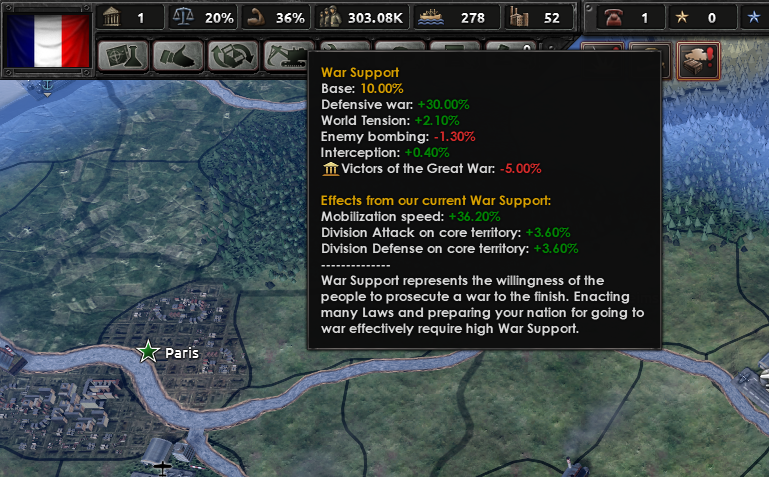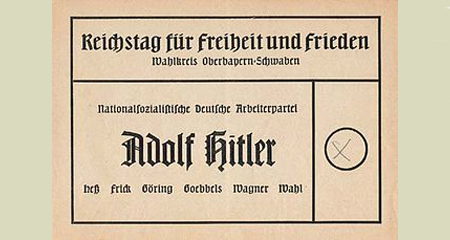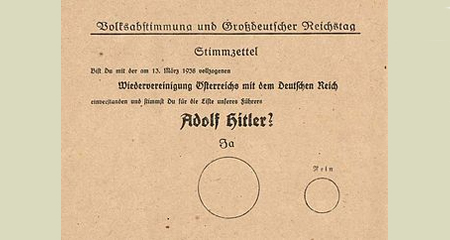Hello everyone! Today we are going to be talking about National Unity, or rather the fact that it no longer exists…
National Unity
National Unity first made its appearance in Hearts of Iron III, basically as a mechanic to make France surrender at an appropriate time (when Paris fell essentially). It was largely moved over to HOI4 unchanged. While it does accomplish what we wanted it's also a very restrictive currency to work with design wise. A player who is winning doesn't really care what their NU is, making a lot of focus choices meaningless in those instances (or almost, there is always that time your country gets blanketed in nukes and someone dropping paras on one of your big cities seals the deal in multiplayer). We wanted to model different nations better and make sure we could do more interesting focuses and events where picking a loss of NU wasn't always the better choice compared to giving up, say, political power. So what's the answer?
Stability and War Support
These are two new values shown in the topbar that replace National Unity. Stability models the people's unity and support for the current government. War Support on the other hand represent the people’s support of war and of fully committing to fighting that war. As an example Britain in 1936 would be a pretty stable nation, but with very low war support. A nation like France would be much more unstable and with equally low war support, while Japan would have high war support and also high stability (mostly due to the emperor’s influence).
Stability average is 50% and nations with higher stability than that gain bonuses to industry, political power and consumer goods. Once you drop below 50% there are penalties instead as well as lowering your surrender limit (although nothing as extreme as how NU affected things). Strong party support helps increase stability, but being in a war - no matter how well supported - is going to lower your stability. Stability also works to protect against coups against your nation as well.
War Support has several passive effects and also limits several of the laws. You can’t switch to full War Economy without enough war support for example.
Note that in the picture below France is getting +30% war support because they have been attacked by Germany. An offensive war on the other hand for Germany actually hurts their war support. This comes with some interesting balancing effects:

The air war also affects things as successful enemy bombing (or nuking) will lower War Support. Shooting down enemy bombers will offset this somewhat, as people are seeing you fight back against the enemy.
Here is an example on what can happen in a nation with low war support and low stability in a war. The severity of these particular options depends on exactly how low your stability/war support are. Here it's pretty bad.

For Germany a good way of raising war support is to pull off its diplomatic expansions without being opposed:

War support is also affected by how your allies manage. If a major ally surrenders it will lower your war support, so make sure to keep your friends in the war. On the flip side successfully capitulating major enemies increases your war support.
There are also some new ways to affect War Support and Stability outside events, ministers and national focuses that we aren't ready to show off yet
See you again next week!
National Unity
National Unity first made its appearance in Hearts of Iron III, basically as a mechanic to make France surrender at an appropriate time (when Paris fell essentially). It was largely moved over to HOI4 unchanged. While it does accomplish what we wanted it's also a very restrictive currency to work with design wise. A player who is winning doesn't really care what their NU is, making a lot of focus choices meaningless in those instances (or almost, there is always that time your country gets blanketed in nukes and someone dropping paras on one of your big cities seals the deal in multiplayer). We wanted to model different nations better and make sure we could do more interesting focuses and events where picking a loss of NU wasn't always the better choice compared to giving up, say, political power. So what's the answer?
Stability and War Support
These are two new values shown in the topbar that replace National Unity. Stability models the people's unity and support for the current government. War Support on the other hand represent the people’s support of war and of fully committing to fighting that war. As an example Britain in 1936 would be a pretty stable nation, but with very low war support. A nation like France would be much more unstable and with equally low war support, while Japan would have high war support and also high stability (mostly due to the emperor’s influence).
Stability average is 50% and nations with higher stability than that gain bonuses to industry, political power and consumer goods. Once you drop below 50% there are penalties instead as well as lowering your surrender limit (although nothing as extreme as how NU affected things). Strong party support helps increase stability, but being in a war - no matter how well supported - is going to lower your stability. Stability also works to protect against coups against your nation as well.
War Support has several passive effects and also limits several of the laws. You can’t switch to full War Economy without enough war support for example.
Note that in the picture below France is getting +30% war support because they have been attacked by Germany. An offensive war on the other hand for Germany actually hurts their war support. This comes with some interesting balancing effects:
- Democracies challenging Germany early over Rhineland etc would put themselves as attackers, forcing them to fight hindered by the war support penalty.
- Fascist or aggressive nations will generally have more initial war support but are likely to be surpassed by democracies in a defensive war when it comes to war support.
- Defensive nations will be able to ramp up army sizes faster due to mobilization speed while attackers need to play a bit more carefully. The return of “national pride” from HOI3 in the form of combat bonuses on core territory will help here too.

The air war also affects things as successful enemy bombing (or nuking) will lower War Support. Shooting down enemy bombers will offset this somewhat, as people are seeing you fight back against the enemy.
Here is an example on what can happen in a nation with low war support and low stability in a war. The severity of these particular options depends on exactly how low your stability/war support are. Here it's pretty bad.

For Germany a good way of raising war support is to pull off its diplomatic expansions without being opposed:

War support is also affected by how your allies manage. If a major ally surrenders it will lower your war support, so make sure to keep your friends in the war. On the flip side successfully capitulating major enemies increases your war support.
There are also some new ways to affect War Support and Stability outside events, ministers and national focuses that we aren't ready to show off yet
See you again next week!



